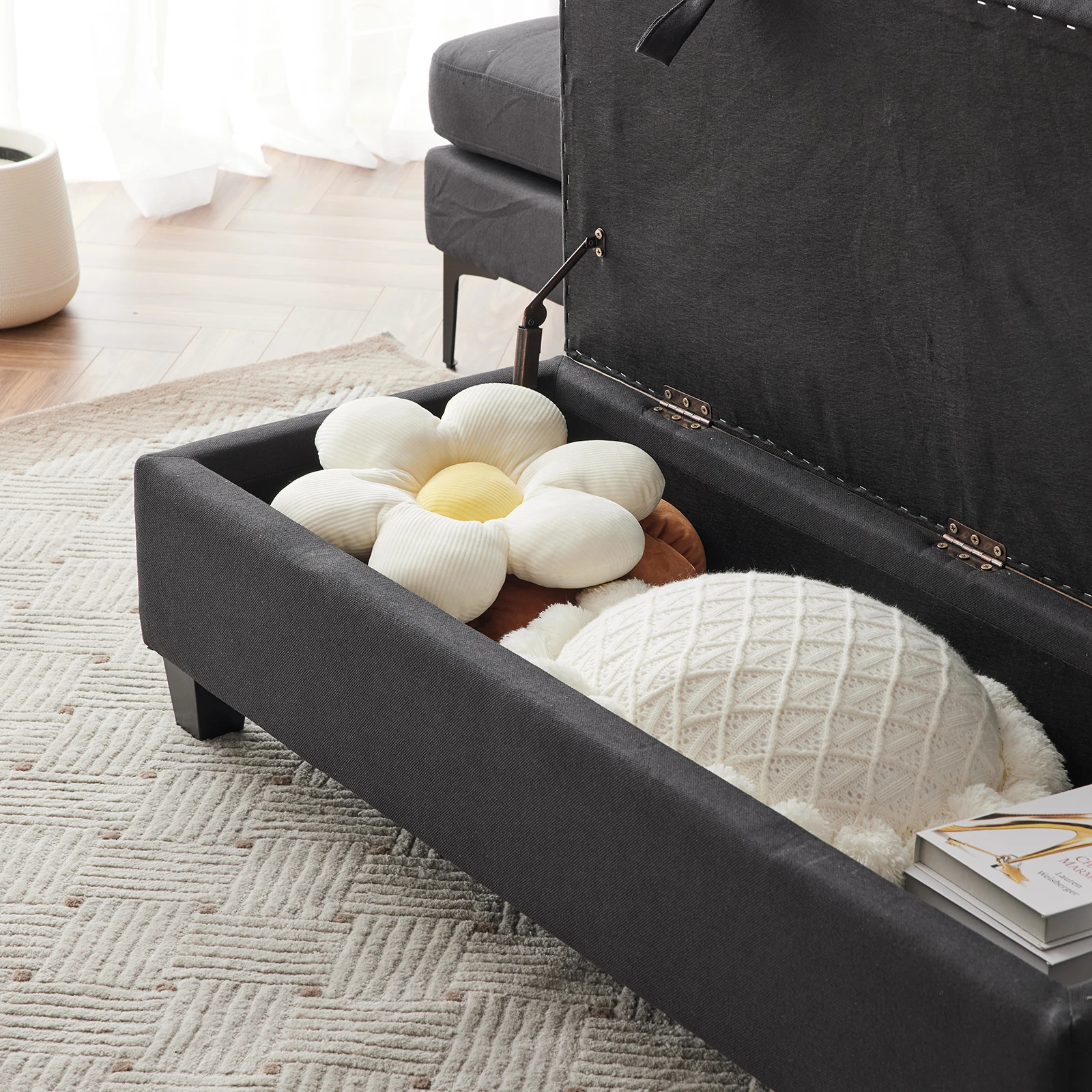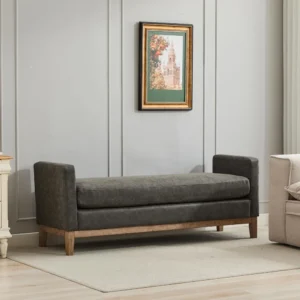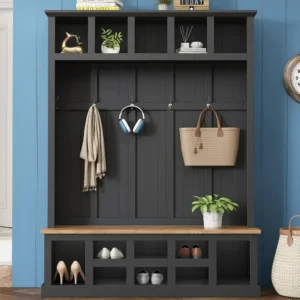The Hidden Cost of Entryway Clutter: Why Organization Matters
Walking into a cluttered entryway after a long day can instantly increase your stress levels. That moment of frustration when you can’t find your keys, the morning rush made worse by missing shoes, and the constant battle against piles of coats and bags – these daily challenges take a real toll on your wellbeing and efficiency.
The impact of entryway disorganization goes beyond mere annoyance:
- The average person spends nearly 6 months of their lifetime searching for misplaced items
- A cluttered environment can raise cortisol levels (the stress hormone)
- Families lose up to 30 minutes each morning dealing with disorganized entryways
- Misplaced essentials like keys, wallets, and important papers can cause missed appointments and late arrivals
A well-organized entryway does more than just look nice – it creates a buffer zone between the chaos of the outside world and the sanctuary of your home. When properly designed, your entryway becomes the control center that helps your household run smoothly, reducing stress and setting a positive tone for both departures and arrivals.
Implementing strategic organization systems for small entryways transforms this high-traffic area from a source of daily frustration into a functional space that supports your family’s routines and reduces morning chaos.
Assessing Your Entryway Needs: The Foundation of Smart Storage
Before purchasing any storage solutions, take time to thoroughly evaluate your entryway’s specific requirements. This assessment will prevent wasted money on inappropriate options and ensure your organization system truly addresses your family’s needs.
Space Evaluation
Start by measuring your available area, noting:
– Total square footage
– Width and height of walls
– Door swing clearance
– Traffic flow patterns
Don’t forget to consider how people actually move through the space. Even a generous entryway can feel cramped if storage blocks natural pathways. Implementing creative space-saving entryway ideas works best when you understand your spatial constraints.
Inventory Assessment
Create a complete list of items that regularly pass through or stay in your entryway:
– Daily essentials (keys, wallets, phones)
– Seasonal items (umbrellas, sunscreen, winter accessories)
– Family-specific needs (backpacks, sports equipment)
– Pet supplies (leashes, waste bags, paw cleaners)
Categorize these items by frequency of use and size to determine appropriate storage solutions.
Usage Patterns
Monitor how your family actually uses the entryway:
– Who enters/exits at what times?
– Where do bottlenecks occur?
– What items frequently become misplaced?
– Are there accessibility considerations for family members?
Understanding the perfect entryway bench height and other dimensional considerations ensures comfort and usability for all family members, regardless of age or ability.
Special Requirements
Consider any unique needs:
– Children’s ability to reach and use storage independently
– Pet-related storage for leashes and cleanup supplies
– Accessibility requirements for family members with mobility concerns
– Seasonal adjustments needed for changing weather conditions
By thoroughly assessing these factors before implementing solutions, you’ll create an organization system tailored to your specific household rather than forcing generic solutions into your unique space.
Multi-Functional Furniture Solutions for Maximum Efficiency
In busy homes where space is at a premium, furniture that serves multiple purposes is essential. The right multi-functional pieces can dramatically transform your entryway’s organization while maintaining style and comfort.
Storage Benches: Seating Meets Organization
Storage benches offer an ideal combination of practical seating and hidden organization:
- Provide a comfortable spot to put on and remove shoes
- Conceal seasonal items, rarely-used accessories, or cleaning supplies
- Create a finished look while eliminating visible clutter
- Available in various widths to accommodate different entryway sizes
Many homeowners find that investing in quality entryway bench storage solutions pays dividends through years of daily use. Look for benches with lift-up lids, drawers, or cubbies depending on what items you need to store.
Hall Trees: The All-in-One Solution
For comprehensive organization in a single unit, hall trees and coat rack benches offer unmatched functionality:
- Vertical storage with hooks for coats, bags, and accessories
- Bench seating for comfort while removing shoes
- Shelving or cubbies for additional storage
- Mirror options for last-minute appearance checks
- Some include shoe storage in the base
These complete entryway hall tree solutions work particularly well for families who need organized storage for multiple people but don’t want to install separate components.
Console Tables With Storage
For narrow entryways where floor space is limited:
- Slim profile fits against walls without impeding traffic flow
- Drawers conceal small items like keys and mail
- Lower shelves can hold baskets for additional organization
- Surface provides display space and drop zone for daily items
Built-In Cabinetry
For a permanent, customized solution:
- Maximizes use of available space including awkward corners
- Can be designed to exact specifications of your family’s needs
- Creates a polished, integrated look
- Offers the most comprehensive storage options
When selecting multi-functional furniture, consider these material factors:
| Material | Durability | Maintenance | Best For |
|---|---|---|---|
| Solid wood | High | Moderate | Long-term investment, classic styles |
| Engineered wood | Medium | Easy | Budget-friendly options |
| Metal frames | Very high | Easy | Modern spaces, heavy use |
| Upholstered | Varies | Higher | Comfort, sound dampening |
The key is selecting pieces that address multiple storage needs simultaneously while complementing your home’s style and withstanding your family’s level of use.
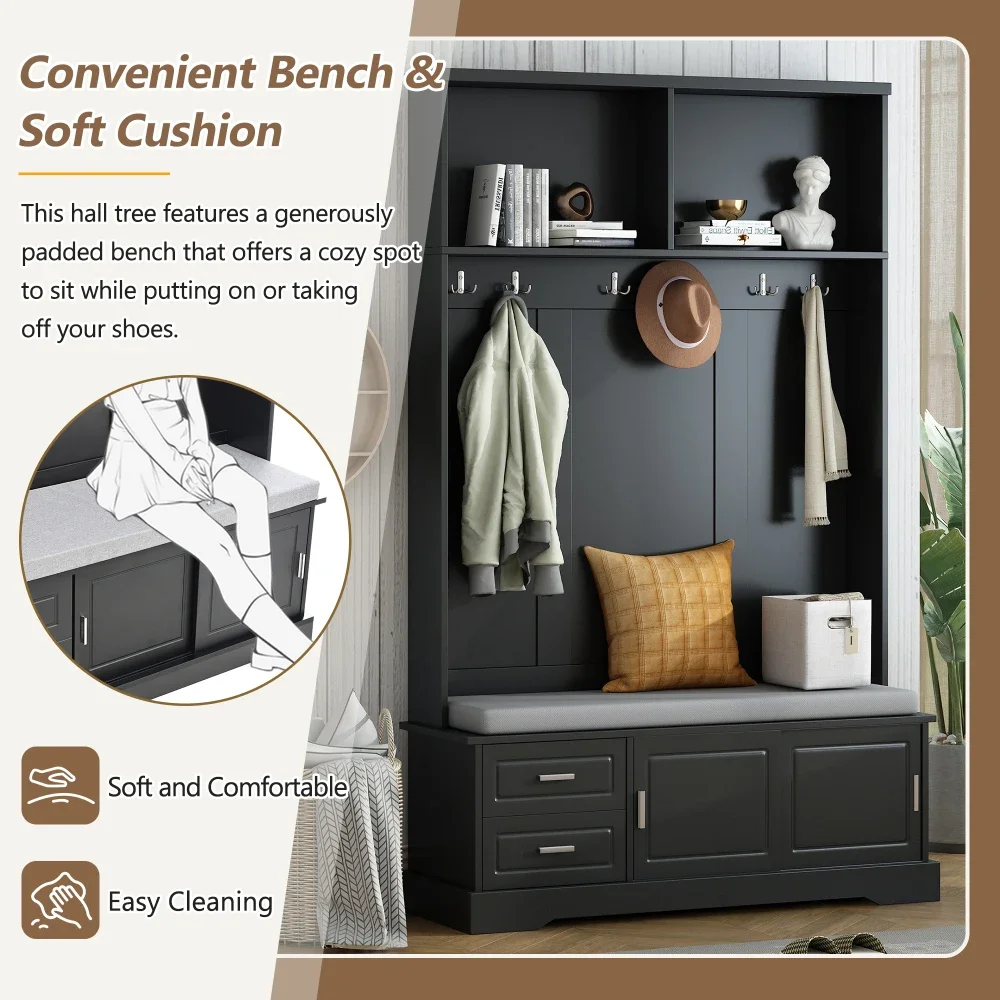
Vertical Storage Strategies: Utilizing Wall Space Effectively
When floor space is limited, look up! Your entryway walls offer valuable real estate for organization that doesn’t intrude on walking paths. Strategic vertical storage keeps frequently used items visible and accessible.
Wall-Mounted Hook Systems
Hook systems provide immediate accessibility for items you use daily:
Installation height considerations:
– Place adult hooks at 60-66 inches from the floor
– Install children’s hooks at 30-40 inches for independent access
– Ensure adequate spacing between hooks (8-12 inches minimum)Weight capacity:
– Standard decorative hooks: 5-10 pounds
– Heavy-duty utility hooks: 20-50 pounds
– Use appropriate anchors based on wall type and expected loadStyles and options:
– Individual hooks for minimalist aesthetics
– Hook rails for space efficiency
– Decorative hooks that enhance your decor
– Hidden hooks for clean appearances
Wall organization works particularly well when combined with best small benches for entryways to create a complete storage system without consuming excessive floor space.
Floating Shelves
Floating shelves provide display space while offering practical storage:
Optimal placement:
– Install at eye level for frequently accessed items
– Consider staggered arrangements for visual interest
– Allow adequate clearance below for taller items on lower surfacesCapacity considerations:
– Check weight limits before installing (typically 15-50 pounds)
– Use proper mounting hardware for your wall type
– Distribute weight evenly across the shelfOrganization strategies:
– Add small containers to corral loose items
– Use decorative baskets that match your decor
– Create designated zones for different family members
Wall-Mounted Cabinets
For concealed vertical storage, wall-mounted cabinets offer clean aesthetics:
- Shallow depths (6-12 inches) prevent interference with traffic flow
- Mirrored options serve dual purposes
- Locking options for secure storage of valuables
- Interior organizers maximize efficiency
Creative vertical solutions represent some of the most effective brilliant storage solutions for conquering chaos in busy households. By utilizing wall space intelligently, even the smallest entryways can accommodate your family’s storage needs without feeling cramped.
Smart Shoe Storage: Tackling the Footwear Challenge
Shoes consistently rank among the most challenging entryway items to organize. They’re bulky, often dirty, and the average family accumulates many pairs that rotate through regular use. Effective shoe storage systems prevent tripping hazards while keeping footwear accessible and protected.
Comparative Shoe Storage Solutions
| Storage Type | Capacity | Best For | Considerations |
|---|---|---|---|
| Open shoe rack | 6-20 pairs | Daily-use shoes | Visible, encourages use but shows clutter |
| Closed cabinet | 8-24 pairs | Neat appearance | Hides shoes but may reduce usage |
| Under-bench storage | 4-8 pairs | Space efficiency | Combines with seating but limited capacity |
| Over-door organizer | 12-24 pairs | Small spaces | Uses no floor space but requires door clearance |
| Rotating carousel | 20-36 pairs | Large collections | Maximizes capacity but requires dedicated space |
Dedicated Shoe Organization Systems
Purpose-built shoe storage addresses specific footwear challenges:
- Tiered racks: Provide visibility and easy access to multiple pairs
- Cubbies: Separate shoes and prevent scuffing between pairs
- Shoe storage benches for entryways: Combine seating with designated shoe compartments
Weather-Resistant Solutions
For wet, muddy conditions:
- Boot trays: Contain moisture and debris from wet footwear
- Drainage systems: Allow shoes to dry without damaging flooring
- Shoe benches for mudrooms: Feature water-resistant materials and easy-clean surfaces
Seasonal Rotation Strategies
Most families don’t need all shoes accessible at once. Consider:
- Storing off-season footwear in less accessible locations
- Implementing a “one in, one out” policy for entryway shoes
- Using clear containers for less-used shoes to maintain visibility
- Establishing family shoe limits for the entryway area
The most effective shoe storage combines containment with convenience—making it easier to use the system than to leave shoes scattered across the floor.
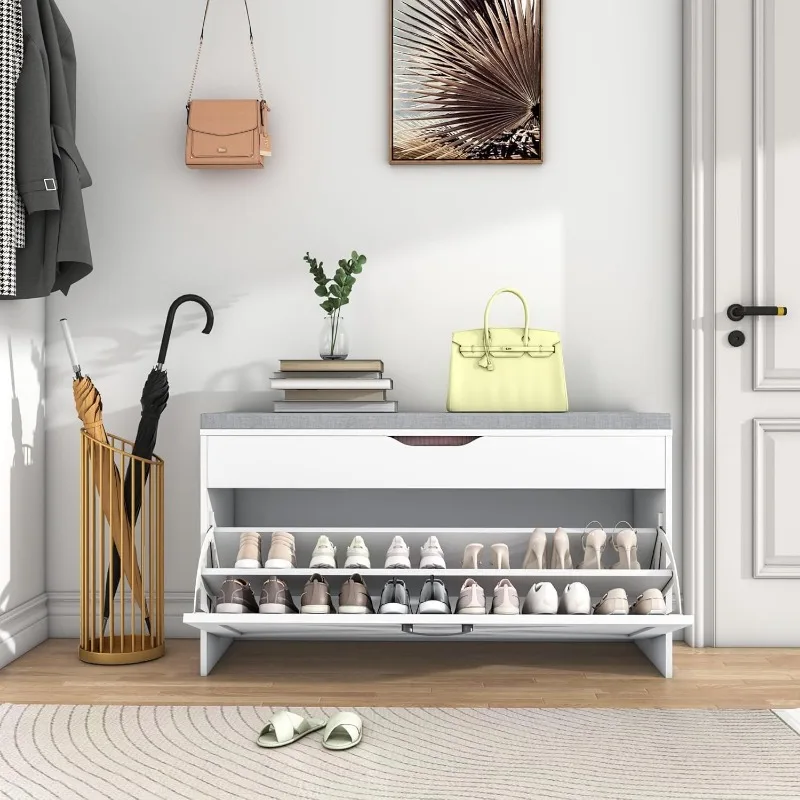
The Essential Drop Zone: Organizing Keys, Mail, and Small Items
Small items cause the biggest frustration when missing. Creating a designated “drop zone” for these essentials prevents the daily scramble for keys, mail, and personal items that so often derails morning routines.
Key Management Systems
Effective key organization prevents frantic searching:
- Wall-mounted key hooks positioned near the door encourage consistent placement
- Magnetic key strips require minimal space while keeping keys visible
- Decorative key bowls work well for households with fewer sets of keys
- Smart key organizers with Bluetooth tracking add technology to traditional storage
Quick Tip: Establish the habit of immediately placing keys in their designated spot upon entering. This single habit can save hours of searching time over the course of a year.
Mail Management
Prevent paper pileups with these strategies:
- Wall-mounted mail sorters with categorized slots (Action, File, Recycle)
- Desktop organizers that sort by family member or priority
- Concealed mail storage in furniture with dedicated compartments
- Combination mail and key centers for comprehensive organization
Electronic Device Organization
Modern entryways need solutions for tech:
- Charging stations that contain cord clutter while powering devices
- Designated “parking spots” for tablets and phones
- Cable management systems that prevent tangled messes
- Combination storage that houses both electronic and traditional items
Furniture pieces with hooks and storage combinations provide integrated solutions that address multiple needs simultaneously. Look for options with both open storage for visibility and closed storage for containing visual clutter.
The most successful drop zones share key characteristics:
– Located directly in the path between door and home interior
– Highly visible and easily accessible
– Clearly designated purpose for each storage component
– Adequate capacity for all household members’ essentials
– Aesthetic appeal that encourages consistent use
By creating an intuitive system for these small but essential items, you’ll eliminate one of the most common sources of daily stress and time waste.
Kid-Friendly Organization: Solutions That Grow with Your Family
Children present unique organization challenges—they accumulate many items, need accessible storage, and are still developing habits. Kid-friendly entryway systems foster independence while maintaining order.
Height-Appropriate Storage Solutions
Design with your children’s physical abilities in mind:
- Coat hooks at 30-40 inches from floor for younger children
- Step stools near adult-height storage for supervised access
- Graduated heights for families with children of different ages
- Adjustable systems that can be modified as children grow
Personalization Strategies
Personalization significantly increases children’s engagement with organization systems:
- Color-coded storage zones for different family members
- Name labels or pictures for pre-readers
- Character-themed hooks or bins that excite younger children
- Personalized storage that grows more sophisticated with age
School and Activity Equipment Organization
Manage the constant flow of educational and extracurricular gear:
- Designated backpack hooks sturdy enough for loaded bags
- Paper management systems for school communications
- Sport-specific cubbies for equipment and uniforms
- Rotation systems for seasonal activities
Child-Friendly Features
Consider these special features for households with children:
- Washable, durable materials that withstand rough handling
- Rounded corners on furniture to prevent injuries
- Open storage that makes cleanup easier for young helpers
- Visual systems that make organization intuitive
For families watching their budget, affordable entryway bench solutions provide cost-effective starting points for creating kid-friendly organization. The best children’s storage systems grow and adapt with your family while teaching valuable organizational skills that benefit children throughout life.
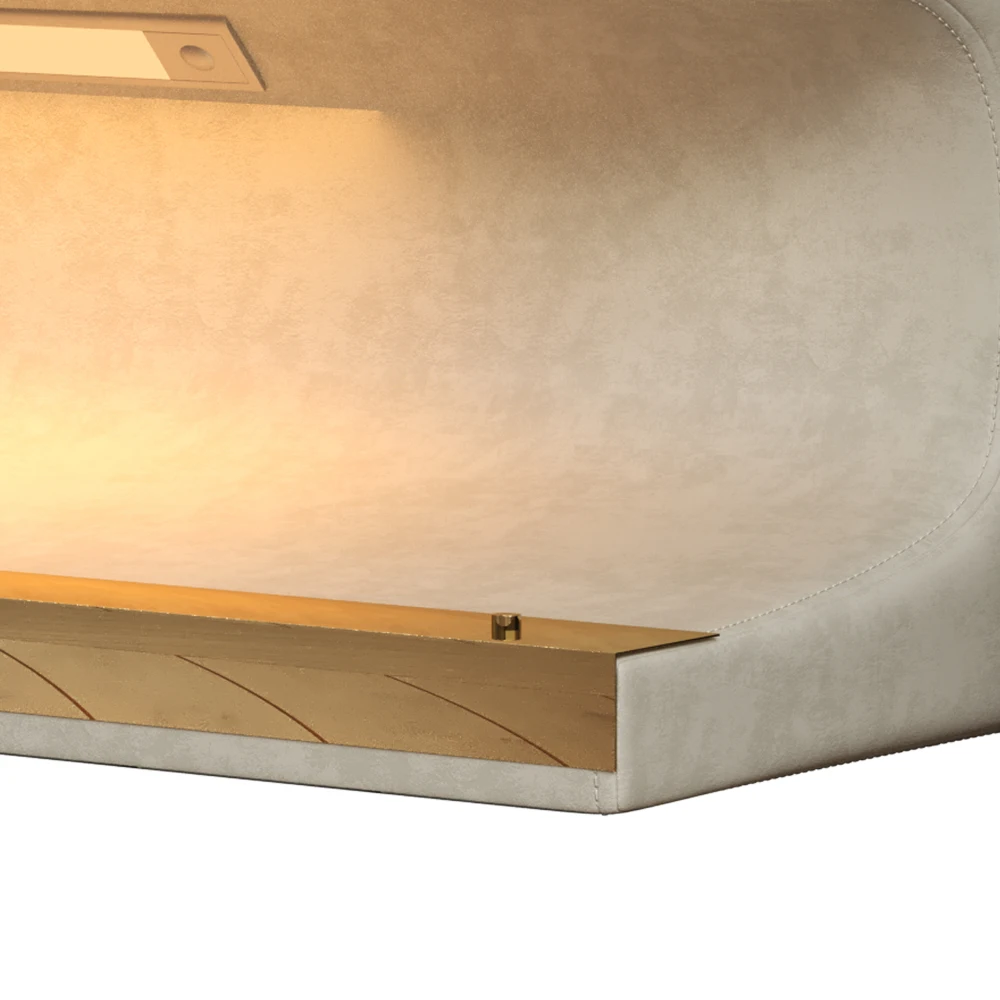
Pet-Friendly Entryway Organization: Leashes, Toys, and Paw Care
Our furry family members introduce special considerations for entryway organization. A pet-friendly entry system keeps animal supplies contained while addressing the unique challenges pets bring to our homes.
Leash and Accessory Management
Create dedicated pet supply zones:
– Install hooks at appropriate heights for leashes and harnesses
– Use labeled bins for pet-specific items like waste bags and portable water bowls
– Implement hanging organizers with multiple pockets for smaller accessories
– Consider retractable leash mounts for tangle-free storage
Paw Parent Tip: Position leash storage near a small shelf that can hold treats. This pairing makes leashing up a more positive experience for pets who associate the area with rewards.
Paw Cleaning Stations
Minimize tracked-in dirt and debris:
– Designate a specific entry point for post-walk returns
– Install absorbent mats that capture moisture and dirt
– Keep a towel holder stocked with pet-specific cleaning cloths
– Consider a paw-washing cup or station for rainy days
Pet Toy Containment
Prevent toy sprawl with these solutions:
– Use ventilated baskets that allow air circulation for damp toys
– Implement covered storage for less attractive pet items
– Choose washable containers that can be regularly cleaned
– Consider dual-purpose furniture that serves as both storage and pet resting areas
Mudroom benches with shoe storage often work perfectly for pet supplies as well, offering compartments for accessories and durable surfaces that withstand paw traffic and occasional accidents.
Feeding Station Integration
For homes where pets eat near the entryway:
– Utilize furniture with built-in pet dish compartments
– Install wall-mounted food storage containers for easy access
– Use sealed containers to prevent food odors and pest attraction
– Consider elevated feeding stations integrated with entryway furniture
The most successful pet organization systems acknowledge our animals’ natural behaviors while providing practical solutions that make pet care easier for human family members.
Seasonal Adaptability: Adjusting Your Storage Throughout the Year
An effective entryway organization system must adapt to changing weather conditions and seasonal activities. Flexible storage prevents overcrowding during heavy-use seasons and maximizes space year-round.
Seasonal Rotation Strategy
Implement a quarterly rotation system:
– Store only current-season items in prime accessibility areas
– Establish secondary storage for off-season items
– Create a seasonal transition checklist to ensure nothing is missed
– Schedule regular rotation days that coincide with seasonal changes
Winter-to-Spring Transition Checklist:
– Remove and clean winter boots, coats, and accessories
– Store clean winter gear in vacuum-sealed bags or containers
– Bring out rain jackets, umbrellas, and lighter footwear
– Adjust hook heights for lighter-weight clothing
– Replace heavy-duty mats with lighter options
Bulky Item Management
Cold weather seasons bring bulkier items that require special consideration:
– Install temporary hooks for additional winter coat storage
– Utilize under-bench areas for boot storage during snowy months
– Implement vertical storage solutions for long items like umbrellas
– Consider collapsible containers that can be reduced in size during off-seasons
Weather-Specific Solutions
Different weather conditions require specialized organization:
– Water-resistant trays for wet umbrellas and boots
– Ventilated storage for damp items to prevent mildew
– Dedicated space for seasonal sports equipment like beach gear or ski accessories
– Quick-dry mats that can be easily cleaned and switched out
Even homes with minimal entryway space can accommodate seasonal needs by maximizing small spaces with smart entryway benches. Look for furniture with adjustable storage compartments that can be reconfigured as seasonal needs change.
Material Selection Guide: Durability Meets Style
The materials you choose for entryway storage significantly impact both longevity and aesthetics. In high-traffic areas like entryways, durability cannot be sacrificed for style—but fortunately, you can have both.
Material Comparison for Entryway Storage
| Material | Durability | Maintenance | Style Profile | Best Applications |
|---|---|---|---|---|
| Solid Wood | High | Moderate | Traditional, warm, timeless | Storage benches, hall trees, heirloom pieces |
| Metal | Very High | Low | Industrial, modern, sleek | Hooks, racks, frame structures |
| Engineered Wood | Medium | Low | Versatile, contemporary | Budget furniture, painted pieces |
| Plastic/Resin | Medium-High | Very Low | Modern, lightweight | Shoe storage, washable components |
| Wicker/Rattan | Medium | Moderate | Coastal, relaxed, textural | Baskets, decorative storage |
| Upholstered Elements | Low-Medium | High | Comfortable, sound-absorbing | Bench tops, cushioned seating |
Moisture Resistance Considerations
Entryways face unique moisture challenges from weather exposure:
– Look for sealed or treated wood that resists warping
– Consider metal components with rust-resistant coatings
– Choose fabrics with stain-resistant treatments for upholstered pieces
– Select flooring and mats specifically designed for wet-dry transitions
Wood entryway benches offer exceptional durability when properly finished, providing both timeless appeal and practical function. Select hardwoods like oak, maple, or walnut for the greatest longevity in high-traffic areas.
Material Maintenance Requirements
Consider your willingness to perform regular maintenance:
– Wood requires occasional polishing or refinishing
– Metal may need touch-ups to prevent rust in humid environments
– Upholstery benefits from regular vacuuming and occasional deep cleaning
– Plastics and laminates need just simple wipe-downs but may show scratches
The ideal materials for your entryway balance your aesthetic preferences with practical considerations of your household’s activity level and your available maintenance time.
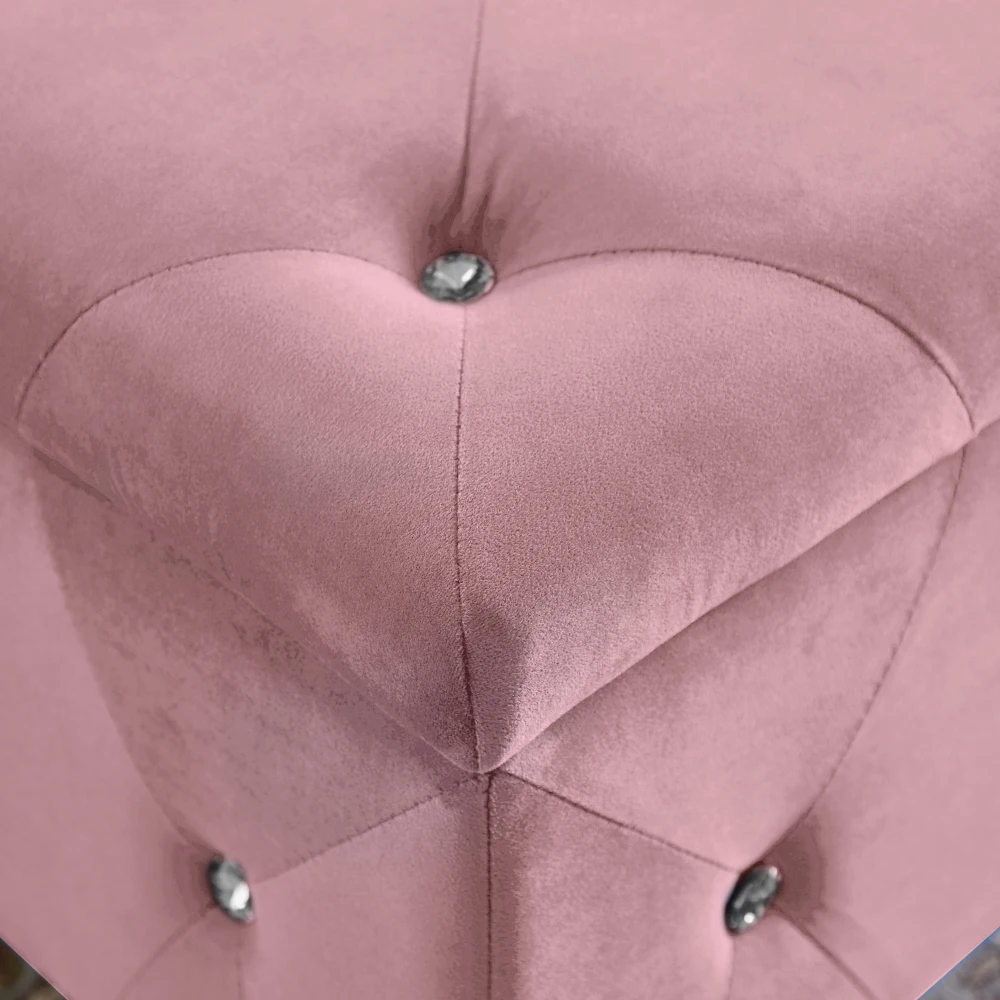
DIY vs. Ready-Made: Finding the Right Approach for Your Home
When creating your entryway organization system, you’ll face the decision between purchasing ready-made solutions and crafting custom DIY options. Each approach offers distinct advantages and challenges.
Cost Comparison
Ready-Made Pros:
– No tool investment required
– Consistent quality and finish
– Warranty protection
– Immediate availability
DIY Pros:
– Potentially lower material costs
– No markup for labor
– Customization without custom pricing
– Ability to use existing materials
For a basic entryway bench with storage:
– Ready-made quality option: $150-$500
– DIY materials for similar project: $75-$200 (plus tools if needed)
Time Investment
Consider your available time and skill level:
– Simple DIY shelf installation: 1-3 hours
– Custom entryway bench construction: 8-20 hours depending on complexity
– Ready-made assembly: Typically 30 minutes to 2 hours
– Professional installation: Usually completed in a single day
Customization Potential
The primary advantage of DIY approaches is customization:
– Exact sizing for unusual spaces
– Perfect material and color matching to existing decor
– Specialized features for unique family needs
– Ability to modify and adapt over time
The complete guide to choosing compact benches can help determine whether your specific needs are better met through customization or if standard sizes will work for your space.
When to Choose Professional Solutions
Some situations warrant professional intervention:
– Built-in cabinetry requiring modification to home structure
– Electrical integration for lighting or charging stations
– Complex woodworking beyond your skill level
– Projects requiring specialized tools you’re unlikely to use again
The best approach often combines ready-made foundational pieces with DIY customization touches that make the space uniquely yours.
Entryway Bench with Cushion, Mudroom Bench with Cushion, Shoe Bench for Entryway
$1,186.63 Select options This product has multiple variants. The options may be chosen on the product pageCoat Rack Shoe Bench, Corner Entryway Bench, Corner Hall Tree, Shoe Bench for Entryway
$313.58 Select options This product has multiple variants. The options may be chosen on the product pageEntryway Bench with Back, Modern Entryway Bench, Shoe Bench for Entryway
Price range: $463.13 through $474.44 Select options This product has multiple variants. The options may be chosen on the product pageShoe Storage Bench for Entryway
$459.02 Select options This product has multiple variants. The options may be chosen on the product pageCorner Entryway Bench, Entryway Bench with Cushion, Modern Entryway Bench, Shoe Bench for Entryway
$476.34 Select options This product has multiple variants. The options may be chosen on the product pageBench with Hooks and Storage, Entryway Hall Tree, Mudroom Bench with Cubbies, Mudroom Bench with Shoe Storage
$818.38 Select options This product has multiple variants. The options may be chosen on the product page
Organization Maintenance: Keeping Your System Working Long-Term
Creating an organized entryway is only the beginning—maintaining that organization requires consistent habits and regular system evaluation. Even the best storage solutions fail without proper maintenance routines.
Daily Reset Routine
Implement a 5-minute evening reset:
– Return items to designated homes
– Hang up coats and bags
– Sort incoming mail
– Remove items that belong elsewhere
– Wipe down high-touch surfaces
This simple daily practice prevents accumulation and maintains system functionality.
Weekly Maintenance Tasks
Schedule these tasks once weekly:
– Empty collection baskets and process contents
– Wipe down storage surfaces
– Check for items needing repair or cleaning
– Return misplaced items to proper locations
– Assess system effectiveness and make minor adjustments
Family Participation Strategies
Sustainable organization requires full household involvement:
– Assign age-appropriate responsibilities
– Create visual reminders for younger children
– Implement positive reinforcement for consistent habits
– Hold brief family meetings to address system breakdowns
– Make organization convenient enough that it’s easier than creating clutter
System Evaluation Indicators
Watch for these signs that your system needs adjustment:
– Items consistently left on floors or surfaces rather than stored properly
– Family members expressing frustration with access or usage
– Storage that’s consistently overflowing
– Certain items regularly becoming misplaced
– Changed family needs (new activities, additional family members)
For ongoing organization success, particularly in smaller homes, space-saving entry benches provide adaptable solutions that can evolve with changing family needs while maintaining consistent functionality.
Functional But Stylish: Design Tips for an Attractive Entryway
Organization doesn’t have to sacrifice aesthetics. With thoughtful design approaches, your entryway can serve as both a functional storage zone and an attractive introduction to your home.
Color Coordination Strategies
Create visual cohesion through color:
– Choose storage pieces in complementary finishes
– Use a consistent color palette for baskets and containers
– Consider how your storage colors transition to adjoining rooms
– Use color-coding subtly for organization without visual chaos
Design Tip: Select container colors that are slightly darker or lighter versions of your wall color for a sophisticated, cohesive look that doesn’t sacrifice function.
Decorative Storage Solutions
Elevate utilitarian storage with these approaches:
– Replace plastic bins with woven baskets or fabric cubes
– Select hooks and hardware with decorative details
– Use vintage containers repurposed for modern storage needs
– Incorporate plants or art alongside functional pieces
Lighting Considerations
Proper lighting enhances both function and appearance:
– Install task lighting near key organization zones
– Consider motion-activated options for convenience
– Use lighting to highlight architectural features while providing functional illumination
– Add battery-operated lights inside dark storage areas
Balancing Open and Closed Storage
The most attractive organized spaces combine storage types:
– Use closed storage for visually busy or unattractive items
– Display aesthetically pleasing essentials on open shelving
– Incorporate decorative elements alongside functional pieces
– Create visual “breathing room” rather than filling every space
Nested Goods offers modern entryway benches that exemplify this balance between style and function, providing essential organization while serving as attractive furniture pieces that enhance your home’s first impression.
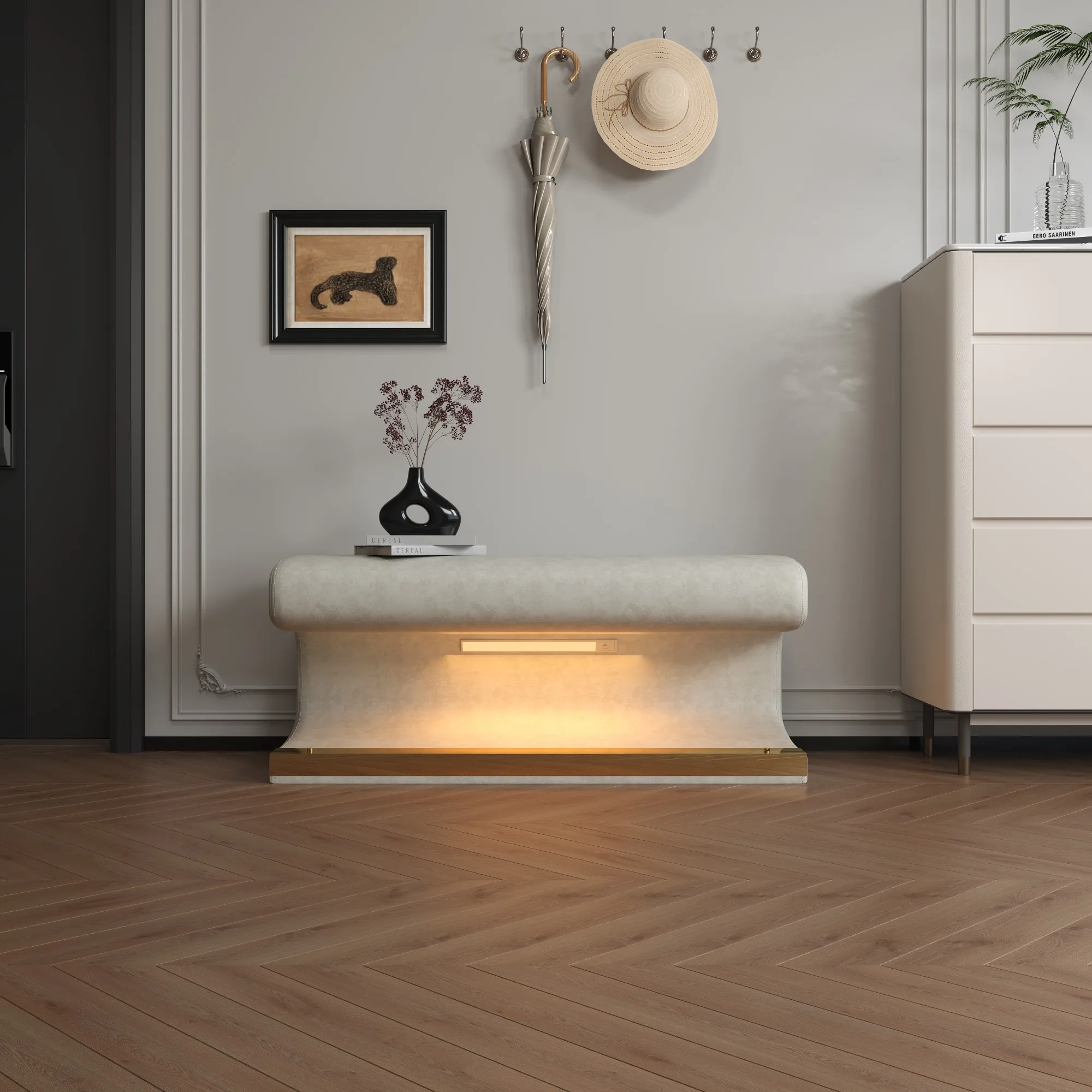
Common Challenges and Solutions for Busy Entryways
Even with careful planning, certain entryway challenges require creative problem-solving. These solutions address the most common obstacles families face when organizing high-traffic entry areas.
Challenge: Extremely Limited Space
Solutions for tiny entryways:
– Wall-mounted fold-down desks repurposed as drop zones
– Over-the-door organizers for shoes and accessories
– Corner shelving units that maximize overlooked spaces
– Ceiling hooks for rarely-used seasonal items
– Narrow entryway benches specifically designed for tight spaces
Challenge: Multi-Generational Storage Needs
Solutions for diverse household ages:
– Tiered storage with different heights for various family members
– Adjustable systems that can be modified as children grow
– Labeled storage zones for different generations
– Accessible options for family members with mobility concerns
– Combination of open and private storage for different preferences
Challenge: Rental Property Constraints
Non-permanent solutions:
– Tension rod systems that don’t require wall mounting
– Freestanding furniture that provides storage without installation
– Command hooks and removable adhesive solutions
– Weighted coat racks that don’t require attachment
– Space-saving entryway seating solutions that stand independently
Challenge: Shared Building Entryways
Solutions for multi-unit buildings:
– Clearly labeled personal storage containers
– Locking options for valuable items
– Weather-resistant solutions for unheated common areas
– Compact, vertical designs that respect neighbors’ space
– Mobile units that can be moved for cleaning or maintenance
Challenge: Accessibility Requirements
Solutions for mobility concerns:
– Seating at appropriate transfer heights
– Open storage that doesn’t require difficult clasps or closures
– Extended handles or pulls for easier gripping
– Clear floor paths with no protruding obstacles
– Touch-activated lighting for visibility
By addressing these common challenges proactively, even the most difficult entryway situations can be transformed into functional, organized spaces that serve your household’s unique needs.
Is Your Entryway Organization Worth the Investment? Calculating the ROI
When considering time and money investments in entryway organization, many homeowners wonder if the benefits truly justify the costs. Understanding the comprehensive return on investment helps make informed decisions about where to allocate resources.
Time Savings Calculation
The average person spends:
– 6 minutes daily searching for misplaced items
– 15-30 minutes weekly dealing with entryway clutter
– 2-3 hours monthly organizing accumulated items
With an effective entryway system:
– Item retrieval time drops to seconds instead of minutes
– Weekly maintenance requires just 5-10 minutes
– Monthly deep organization becomes unnecessary
Over a year, this represents approximately 60+ hours of reclaimed time—nearly a full work week!
Stress Reduction Benefits
Research shows that:
– Visual clutter elevates cortisol levels, increasing stress
– Morning routines set the emotional tone for the entire day
– Coming home to organization provides psychological restoration after stressful days
– Reduced family conflicts occur in organized environments
Financial Benefits
Well-organized entryways provide tangible financial returns:
– Reduced replacement costs for lost items
– Better maintenance of expensive items like coats and shoes
– Potential home value increase (built-ins can offer up to 72% ROI)
– Lower cleaning costs due to reduced dirt distribution
For budget-conscious households, small entryway benches offer affordable starting points that provide significant organizational benefits without major investment.
When calculating the complete return on investment, most families find that entryway organization systems pay for themselves within the first year through time savings, stress reduction, and preserved value of belongings.
Beyond the Entryway: Extending Your Organization System
While the entryway serves as your home’s organization hub, its systems should connect logically to storage throughout your home. Creating these connections ensures smooth item flow and prevents bottlenecks.
Creating Connected Organization Zones
Think of your home’s storage as an ecosystem:
– Entryway provides immediate access to daily essentials
– Adjacent closets handle overflow and less-used seasonal items
– Garage or basement storage connects for bulky outdoor equipment
– Laundry areas link for dirty gear processing
Overflow Storage Strategies
Even the best-designed entryways have capacity limits:
– Create designated “secondary staging” areas for less frequently used items
– Implement clear rotation schedules between primary and secondary storage
– Use consistent labeling systems across all connected storage areas
– Establish guidelines for what belongs in each zone
Whole-Home Organization Flow
The most effective storage systems consider item movement patterns:
– Dirty items have a clear path from entry to cleaning
– Seasonal transitions involve specific relocation procedures
– Children’s items follow intuitive paths based on activities
– Items have both “active duty” and “off-season” homes
Mudroom benches often serve as perfect transition pieces between entryway storage and the rest of your home’s organization system. These versatile pieces bridge the gap between outdoor and indoor zones while providing substantial storage capacity.
By thinking beyond just the entryway and considering your entire home’s organization as an integrated system, you’ll create more sustainable solutions that accommodate your household’s changing needs throughout the seasons and years.
The most successful home organization begins at the entry but extends its principles throughout your living space, creating harmony between different functional areas and making daily life smoother for everyone in your household.

